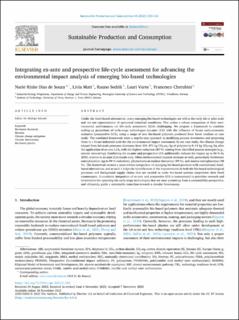| dc.contributor.author | Rinke Dias de Souza, Nariê | |
| dc.contributor.author | Matt, Livia | |
| dc.contributor.author | Sedrik, Rauno | |
| dc.contributor.author | Vares, Lauri | |
| dc.contributor.author | Cherubini, Francesco | |
| dc.date.accessioned | 2024-01-12T12:10:06Z | |
| dc.date.available | 2024-01-12T12:10:06Z | |
| dc.date.created | 2023-12-04T10:03:22Z | |
| dc.date.issued | 2023 | |
| dc.identifier.issn | 2352-5509 | |
| dc.identifier.uri | https://hdl.handle.net/11250/3111305 | |
| dc.description.abstract | Unlike the fossil-based alternatives, many emerging bio-based technologies are still at the early lab or pilot scale and are not representative of optimized industrial conditions. This makes a robust comparison of their environmental performances via life-cycle assessment (LCA) challenging. We propose a framework to combine scaling-up projections of early-stage technologies (ex-ante LCA) with the influence of future socio-economic scenarios (prospective LCA), using a range of new bio-based polymers produced from forest residues as case study. The combined framework takes a step-by-step approach in modifying process inventories and projecting them to a future industrial scale for the environmental impact assessment. In our case study, the climate change impact from lab-scale processes decreases from 105–471 kg CO2-eq./kg of polymer to 9–14 kg CO2-eq./kg after the application of ex-ante LCA, with the highest reduction (83 %) coming from identified process synergies (e.g., solvent recovering). Combining the ex-ante and prospective LCA additionally reduces the impact up to 56 % by 2050, relative to ex-ante LCA results only. Other environmental impacts decrease as well, particularly freshwater eutrophication (up to 99 % reduction), photochemical oxidant formation (99 %), and marine eutrophication (98 %). The framework secures a more robust comparison of emerging bio-based products with conventional fossil-based alternatives, and as such it helps the identification of the improvements in both the bio-based technological processes and background supply chains that are needed to make bio-based systems outperform their fossil counterparts. A consistent integration of ex-ante and prospective LCA is instrumental to prioritize research and investments for upscaling the early-stage technologies that are most promising from a sustainability perspective, and ultimately guide a sustainable transition towards a circular bioeconomy. | en_US |
| dc.language.iso | eng | en_US |
| dc.publisher | Elsevier B. V. | en_US |
| dc.rights | Navngivelse 4.0 Internasjonal | * |
| dc.rights.uri | http://creativecommons.org/licenses/by/4.0/deed.no | * |
| dc.title | Integrating ex-ante and prospective life-cycle assessment for advancing the environmental impact analysis of emerging bio-based technologies | en_US |
| dc.title.alternative | Integrating ex-ante and prospective life-cycle assessment for advancing the environmental impact analysis of emerging bio-based technologies | en_US |
| dc.type | Peer reviewed | en_US |
| dc.type | Journal article | en_US |
| dc.description.version | publishedVersion | en_US |
| dc.source.pagenumber | 319-332 | en_US |
| dc.source.volume | 43 | en_US |
| dc.source.journal | Sustainable Production and Consumption | en_US |
| dc.identifier.doi | 10.1016/j.spc.2023.11.002 | |
| dc.identifier.cristin | 2208136 | |
| dc.relation.project | The EEA and Norway Grants Fund for Regional Cooperation: EEA Grants 2014-2021 - Baltic Research Programme EMP426. | en_US |
| dc.relation.project | The EEA and Norway Grants Fund for Regional Cooperation: EMP426 | en_US |
| cristin.ispublished | true | |
| cristin.fulltext | original | |
| cristin.qualitycode | 1 | |

